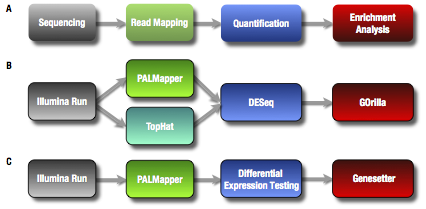I'm trying to figure out which expression quantification program to integrate into the RNA analysis pipeline at my centre.
Since the review by Garber et al. in Nature Methods (June 2011), and the review by Martin and Wang in Nature Reviews (October 2011), there has been a veritable flood of new tools, particularly in the category of transcriptome reconstruction and isoform expression quantification.
From reading those reviews and a quick search through pubmed, I compiled the following list of programs that are capable of giving transcript-level expression information as of December 2012:
Scripture
Cufflinks
MMSEQ
Alexa-Seq
MISO
IsoLasso
CEM
cuffdiff 2
RSEM
FDM
IsoformEx
NSMAP
IQSEQ
DEXSeq
DSGSeq
IsoEM
IsoInfer
iReckon
BitSeq
eXpress
SLIDE
DiffSplice
SplicingCompass
SailFish
This doesn't include tools like DESeq, EdgeR and baySeq that supply only gene-level differential expression.
I've started reading some of the papers for these tools, but honestly, without that much background in statistics, their relative advantages/disadvantages are pretty opaque. There's discussion in these papers of approaches to normalize various biases, handling biological replicates, handling longer read sizes, and providing information on gene- transcript- and in some cases exon-levels.
Anyone have advice or comments about any/all of these new choices?
UPDATE: see below for posts with my impressions of the tools that I've chosen to test out. Learning a lot! All the summaries of tools I've tried are now in one post:
Since the review by Garber et al. in Nature Methods (June 2011), and the review by Martin and Wang in Nature Reviews (October 2011), there has been a veritable flood of new tools, particularly in the category of transcriptome reconstruction and isoform expression quantification.
From reading those reviews and a quick search through pubmed, I compiled the following list of programs that are capable of giving transcript-level expression information as of December 2012:
Scripture
Cufflinks
MMSEQ
Alexa-Seq
MISO
IsoLasso
CEM
cuffdiff 2
RSEM
FDM
IsoformEx
NSMAP
IQSEQ
DEXSeq
DSGSeq
IsoEM
IsoInfer
iReckon
BitSeq
eXpress
SLIDE
DiffSplice
SplicingCompass
SailFish
This doesn't include tools like DESeq, EdgeR and baySeq that supply only gene-level differential expression.
I've started reading some of the papers for these tools, but honestly, without that much background in statistics, their relative advantages/disadvantages are pretty opaque. There's discussion in these papers of approaches to normalize various biases, handling biological replicates, handling longer read sizes, and providing information on gene- transcript- and in some cases exon-levels.
Anyone have advice or comments about any/all of these new choices?
UPDATE: see below for posts with my impressions of the tools that I've chosen to test out. Learning a lot! All the summaries of tools I've tried are now in one post:



Comment